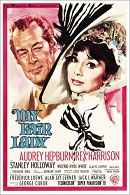Review of 'My Fair Lady'
 When a snobbish phonetics professor Harry Higgins (Rex Harrison) comes across an obviously lower-class woman with a strong east-London accent selling flowers in Covent Garden following a night at the opera he bets a friend Colonel Hugh Pickering (Wilfrid Hyde-White) that in six months he can transform her into a well spoken woman suitable for inclusion into high society. After some convincing the woman, Eliza Doolittle (Audrey Hepburn), agrees to the scheme and Higgins gets to work with long, gruelling days of verbal repetition in his well appointed London house. After six months Doolittle accompanies the professor to a reception at an embassy ball but can she convince the elite she is something she is not?
When a snobbish phonetics professor Harry Higgins (Rex Harrison) comes across an obviously lower-class woman with a strong east-London accent selling flowers in Covent Garden following a night at the opera he bets a friend Colonel Hugh Pickering (Wilfrid Hyde-White) that in six months he can transform her into a well spoken woman suitable for inclusion into high society. After some convincing the woman, Eliza Doolittle (Audrey Hepburn), agrees to the scheme and Higgins gets to work with long, gruelling days of verbal repetition in his well appointed London house. After six months Doolittle accompanies the professor to a reception at an embassy ball but can she convince the elite she is something she is not?
At close to three hours (complete with an interval) the film feels overly long. The first half concentrates on the “education” of Doolittle while the second deals with the aftermath of the embassy ball.
I have to say I found this film left me cold as I was unable to ignore my modern sensibilities and get beyond the sheer ignorance and brutality of the characters towards Doolittle as well as her willing acceptance of it all never mind the idea that your upbringing (and, literally, accent) defines your position in society. Attempting to put this aside now I will say the music is absolutely wonderful filled with songs that many who have never seen the musical or the film will no doubt recognise such as “With a Little Bit of Luck”, “On the Street Where You Live”, “Get Me to the Church On Time”, and “Wouldn't It Be Loverly” written by the incredible musical duo of Alan Jay Lerner (Lyrics) and Frederick Loewe (Music). In this film the studio were not at all confident in Hepburn's voice so her singing was dubbed by soprano Mami Nixon but, to be fair, it is done so well it is quite hard to tell and you could be forgiven for not even noticing. Despite being a musical there are only a handful of dance numbers though particularly of note is the trip to the (genteel) horse races Ascot with musical number “Ascot Gavotte” where the grand and good of society dressed to their nines perform an equally stilted and stiff dance routine.
There is little character development here which is an admirable recognition of the talent of the actors or a tragic mistake on their part. To be fair, Higgins makes no illusions that he will never be anything but the ignorant and self-obsessed person that he is. The only exception to this lack of development is Doolittle herself but here it is under the self-delusion that the solution to all of her problems is to fake being a member of the aristocracy though change she does, casting aside her upbringing for the vision of a better life. Having said that, it is not much to look back with fondness on with a father who spends all his money on drink and scrounging for rejected left-over flowers to sell.
The period sets are good but fail to completely convince with their slightly cramped feel - Yes it is an old London city street but the set seems to dramatically cut off rather than give the impression it continues in all directions. Because of this the film feels like a filmed stage show rather than any attempt at a realistic period drama.
“My Fair Lady” won a lot of awards when it was released and I can see how that would be the case…at the time…however I feel it has not aged well and although the music is absolutely wonderful the sentiment of the story is harsh and unfeeling. Indeed, the very last scene left me completely cold.
A digression: I am a firm believer in the idea that you can better your condition but for someone to shove this down your throat is deeply callous and insensitive as is the belief that your diction and accent dictates your position in society, while to believe that you must always strive to move to an upper class for a happier life I think is delusional. You can be happy in any financial or societal position – It is all up to your attitude and outlook – To think that moving up the social scale will necessarily make you happy is mistaken as it simply introduces a whole new set of worries.
Rating: “Average, but who wants to be average?”
Review Date: 2019-08-11
Directed by: George Cukor
Studio: Warner Bros.
Year: 1964
Length: 170 minutes
Genre: Musical
https://www.imdb.com/title/tt0058385/